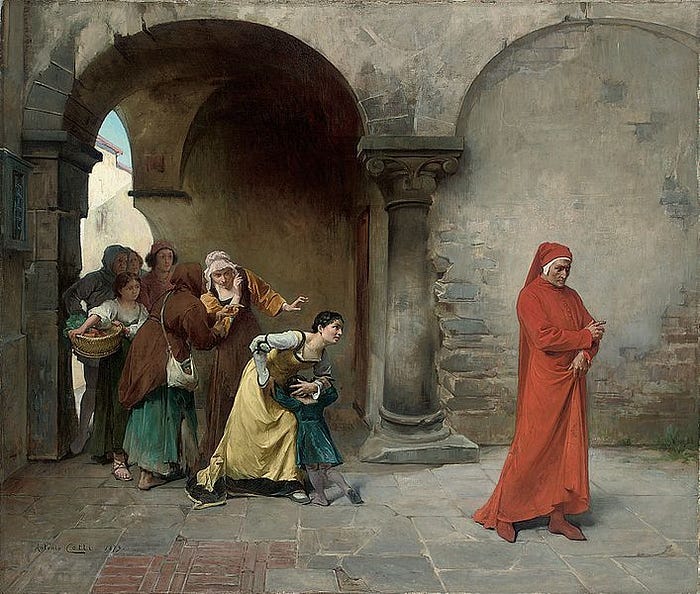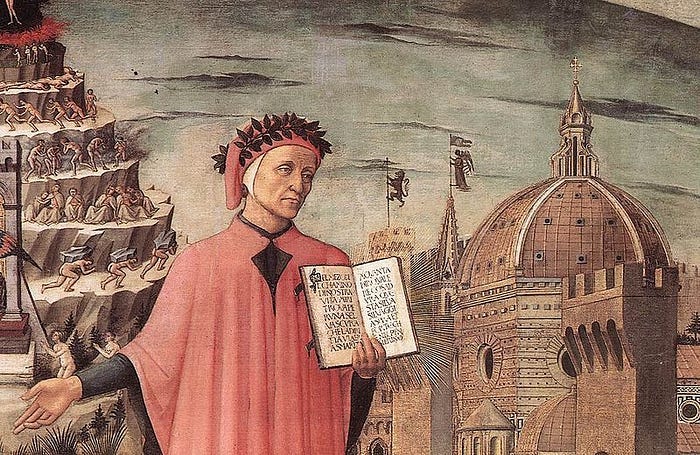A Great Poet’s Immortal Guide For Those Who Feel Lost In Life
Dante Alighieri’s thoughts on ending self-absorption and reconnecting yourself to the right path

“Midway in the journey of our life, I found myself in the midst of a dark wood and the true way was lost.”
— Dante Alighieri, The Divine Comedy
There’s a time in all our lives where we lose our way. It’s usually a transition. Be it from one career to another, a change of relationships, moving to a new home, or even just getting older. But it’s bound to happen.
One day you notice things that give life meaning don’t have the same hold on you they once did. There’s a space or missing piece.
Oddly, it makes Dante Alighieri’s words from almost seven hundred years ago that much more relatable. In many ways it is the “journey of our life.” His archetypal story The Divine Comedy echoes what many of us feel and can’t put into exact words.
He eloquently explains human nature on why we become lost and a solution for pointing our feet towards another solid path.
But before we get into the story, we must know the author and his all too recognizable life. It gives him an innate authority to tell the tale.
What Once Was Meaningful Is Lost
“Dante grew up in a city brimming with postwar pride and expansionism, eager to extend its political control throughout Tuscany. Florentines compared themselves with Rome and the civilization of the ancient city-states.”
— The Encyclopedia Britannica on Dante Alighieri
Dante lived in the city state of Florence in the late 1200s and was in love with his city, likening it to great civilizations of the past. Soon Florentine armies expanded their boundaries and an equally strong intellectual community sprung up.
They welcomed Dante with open arms.
The great writer Brunetto Latini taught the younger generation of Florentine writers (including Dante) to put their ink into the service of the city. He taught them about Aristotle, and the great Romans Cicero and Seneca.
Dante sucked it up like a sponge. By the time he was eighteen many great Florentine writers recognized his ability. He got involved in politics too and his stature rose.
But his political party split, and he found himself on the losing side. In 1302 he was called in front of the new government to be tried for “crimes” against them. After avoiding the sham trial, they sentenced him to death.
So, Dante left the city and life he loved so deeply forever. At thirty-five, or middle age, the poet was lost.
Dante Shows Us What Hell Truly Looks Like
Catholic Bishop Robert Barron in his interview on the AOM podcast says The Divine Comedy is a fictionalized and spiritual story of Dante’s road back to a meaningful life. It starts in the section called The Inferno, or hell.
The poet awakes lost in a dark world. He tries to climb a mountain to get his bearings, but the path is blocked and he’s told he must earn his way to this route. Another great Italian poet Virgil guides him.
While we associate hell with fire, Barron notes Dante’s hell is cold. It’s also shaped like a funnel. The deeper you go, the colder and narrower it gets. According to Bishop Barron:
“Saint Augustine described sin as being ‘incurvatus in se’, which means ‘caved in on oneself’, which always struck me as a really good definition. Those times in life when you’re so self-absorbed and self-preoccupied, self-pitting that you wanna retreat into the recesses of your own self.”
That’s why hell is freezing. Cold makes you grab at your sides and sink into yourself. It narrows because the more self-absorbed you become, the more you sink into yourself, closing off from others.
Virgil explains the only way out of hell is to go deeper, until the two encounter the devil. But Dante’s devil isn’t terrifying. He’s pathetic.
The devil is almost completely encased in ice, chewing on the three greatest traitors in history without devouring them, then crying. He has wings but can’t fly. They only spread more cold and ice when they move.
According to Bishop Barron, Dante’s devil is the epitome of what being in hell is like. You are “stuck coldly in place, making the world around you colder, chewing on past resentments, and weeping in your sadness.”
The devil is even so self-absorbed, he doesn’t notice Dante and Virgil climb his body to escape out of hell.
After facing the darkness within himself, the path up the mountain is opened. Virgil then guides Dante to “Purgatorio,” or purgatory.
Becoming Lighter As You Become Less Self-Absorbed
“He had his…career and all that. But then, see, were not meant just for that…You have to be sort of weaned off of the things that have obsessed you in the first half of life to get now into a deeper place.”
— Bishop Robert Barron, interview on AOM Podcast
Bishop Barron and Brett McKay, the host of the podcast, point out that Dante sees an immediate difference in purgatory. The souls there don’t blame others for their troubles. They accept their own part in creating them and work with others to fix it.
According to the Bishop, those in purgatory “agere contra,” or act against their original sin or failure. For instance, the lazy must run, the prideful carry heavy stones to hold down their “self-elevation,” and the gluttonous go without food.

The souls also get lighter as they do more work. So, it’s a metaphor for lightening the load on yourself from the troubles you created.
Near seven hundred years in the future, psychologist and Holocaust survivor Viktor Frankl said much the same thing in his classic Man’s Search for Meaning. He documents his creation of Logotherapy. This mental therapy is based on the pursuit of meaning, not happiness.
During his psychology practice, Frankl often worked with patients who lost their job and experienced depression. Obviously, work is a source of meaning. But Frankl pointed out another one.
His recommendation: do charity work. It occupies the new free time and gets them out of their own head by helping or experiencing others; much like Dante’s purgatory.
Now since we’ve heard much of the story, the epic poet can guide us to the right path once again.
Dante’s Map For Those Who Suddenly Lose Their Way
Inevitably, on “the journey of our life” we get lost. Dante knew this personally. His Divine Comedy is a timeless story teaching us a way back to the path we wandered away from by doing the following:
Find a guide, preferably someone like yourself who can show you a way out. For Dante, it was Virgil — another great Italian poet.
Search deep within, and specifically look at the negative things you’ve done to put yourself in the place where you are now. Heaven can only be accessed through hell.
Once you understand your failings, there must be an active effort to fix them, or time spent in purgatory.
Don’t do these things alone. A guide isn’t only needed, but a community which helps you work through the issues.
Like most, I experienced this feeling of being lost in my mid-thirties, and authors, philosophers, and experts in various fields became my guides. My inner work took place in journals. Finally, I found community in martial arts, writing groups, and various other clubs.
Honestly, I did much of this before the meaning of Dante’s work was explained to me. Although it is strangely comforting that a person from so long ago felt something like I did and dealt with it the same way.
Hopefully, Dante does the same for you.
-Originally posted on Medium 2/15/23



How do you join writing groups for those of us working on this dark night of the soul so to speak?